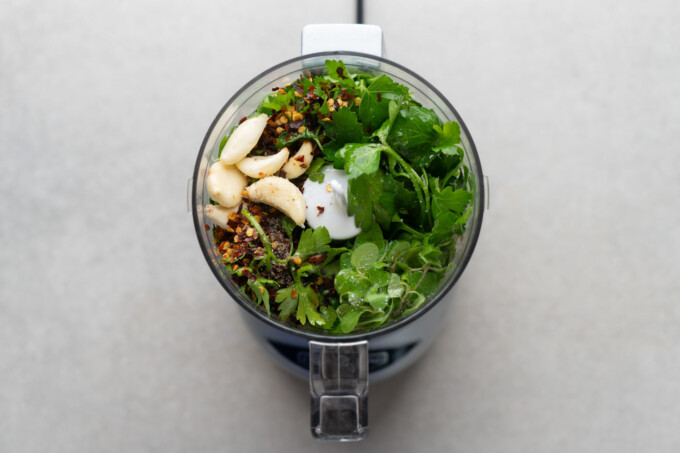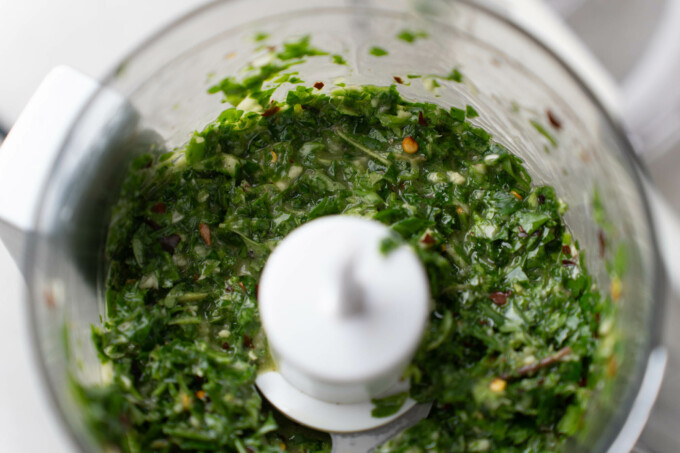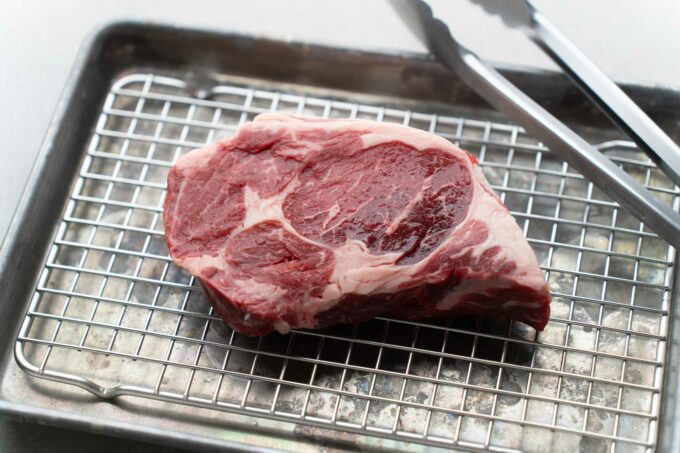
Make this quick and easy chimichurri steak recipe for your next grill night. This fresh, herby, tangy flavor pairs great with a fattier cut of ribeye, though you can use any cut you like.
We’re going to make the chimichurri sauce in under 5 minutes with a food processor and show you some tips and tricks on how to make reverse-seared ribeye steak to serve with this sauce.
Why is it called chimichurri sauce?

Chimichurri is a traditional Argentinian sauce that’s made of chopped herbs, spices, vinegar, and oil to make a great complement to any protein. There are many stories about the origins of this famous sauce, from Basque immigrants from the 19th century to another immigrant from Ireland named Jimmy Curry.
These days, chimichurri is wildly popular in other places in the world, like Mexico and the US. You’ll likely find a side of chimichurri in most steakhouses you visit.
What is chimichurri sauce made of?

All you need to make chimichurri is a simple list
- fresh flat-leaf parsley
- fresh oregano
- extra virgin olive oil
- garlic cloves
- red pepper flakes
- red wine vinegar
- kosher salt
- black pepper
The best part about making chimichurri from home is making personal modifications. Some additions could be shallots or onions for a more savory flavor, red chilies instead of red pepper for a spicier sauce, or more herbs like cilantro.
If you want less of the vinegary punch, you can easily scale that down. You can rehydrate dried herbs in a pinch if you don’t have fresh herbs. Just make sure to add a little water to the herbs to hydrate them properly.
Best steak for chimichurri sauce
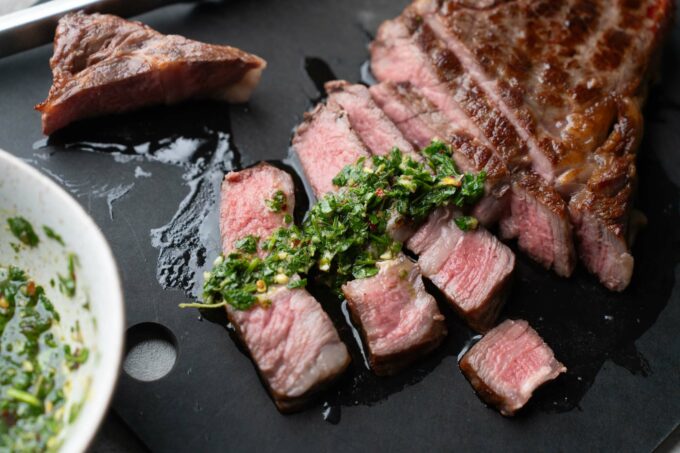
And while Argentinians like to use chimichurri on all types of proteins like chorizo and fish, the combination of chimichurri and a beef steak is the ultimate pairing. Some say the best cut of meat to use is traditional flank or skirt steak, but you can use this sauce on any steak, and it will taste delicious.
In our home, we love a good ribeye, so we do a reverse sear (bake at 175 °F until it hits medium rare, around 130-135 °F, then sear) on a 16 oz one-inch ribeye steak and slice it into ¼ inch pieces to dip into the chimichurri. The acidity from the red wine vinegar in the chimichurri sauce pairs well with the ribeye’s fattiness.
The main benefit of reverse-searing is precise doneness control due to the low temperature baking of the meat first. I’m a control freak and love the precision we can achieve with this. Additionally, since the meat isn’t cooked in ultra high temperatures to reach that doneness, there’s no need to rest it before or after searing the steak in the second step.
How long does chimichurri keep in the fridge?
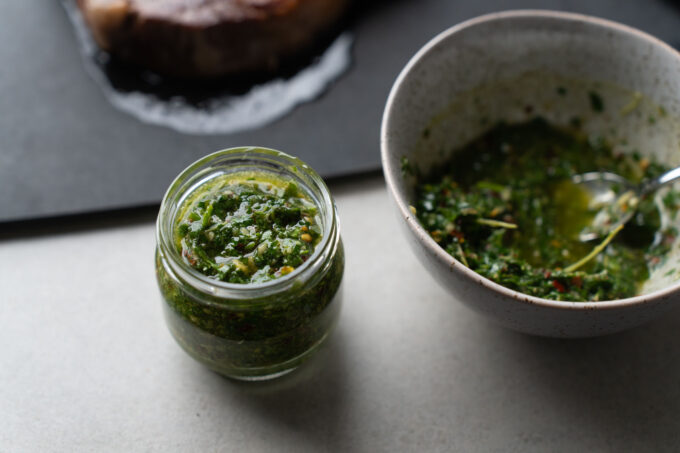
It’s best to eat chimichurri the same day you prepare it to get the freshest flavor, but you can also save leftovers in the fridge. Chimichurri can be left in the refrigerator for 2-3 weeks before it begins to degrade in flavor.
Just make sure to use a clean spoon to serve the sauce instead of dipping your food into the container. It’s best to store chimichurri in a container with a lid so it doesn’t absorb any odors from other food in the fridge or dry out the sauce.
What to serve with chimichurri steak
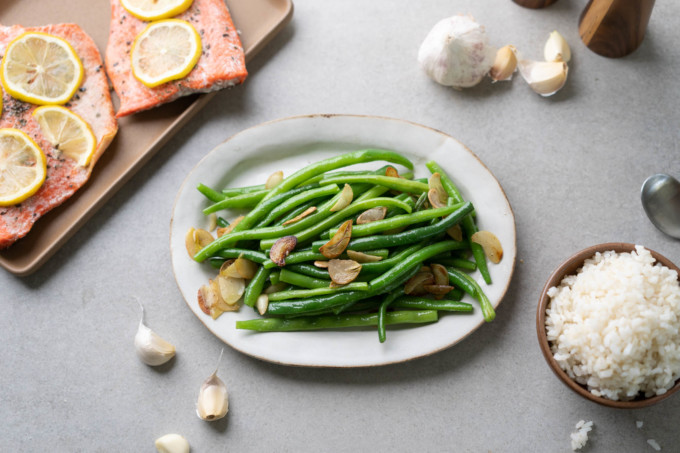
Chimichurri steak is delicious on its own, but I love adding other sides to serve, like ranch roasted potatoes, sauteed green beans with garlic and butter, or a salad with Asian sesame salad dressing.
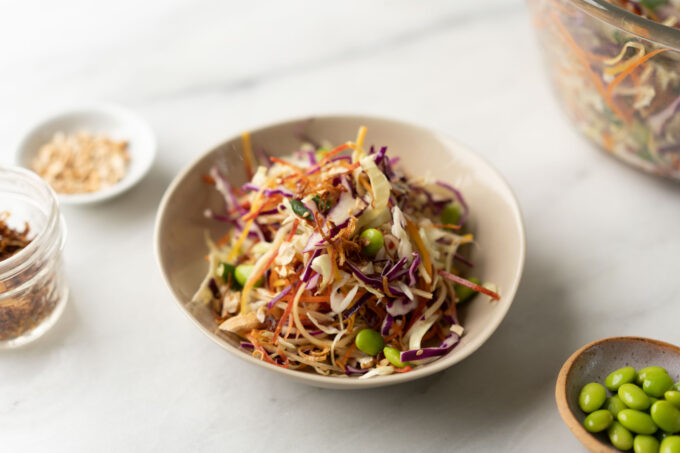
Why is my chimichurri sauce bitter?

Chimichurri can be too bitter if you use over-ripened parsley, so you should taste test the parsley before combining all the ingredients in the food processor. You can also balance the flavors if you find your parsley too bitter.
For example, add more acidity by adjusting the red wine vinegar. The tanginess of the vinegar can counteract the bitterness of the herb. You can also add more salt to reduce the bitter flavor.
Is chimichurri and pesto the same thing?
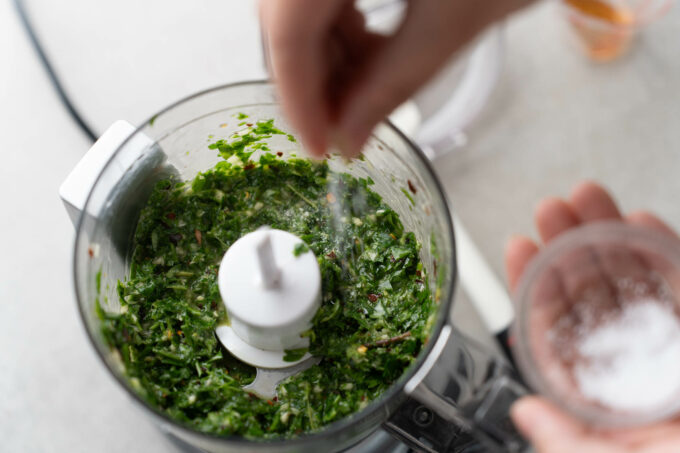
Chimichurri and pesto might look similar, but they are two different sauces. While chimichurri originated from Argentinian and Uruguayan cuisines, pesto comes from Italian cuisine. Chimichurri is made up of a base of minced parsley, olive oil, red wine vinegar, and chili pepper.
Pesto, on the other hand, is made of basil, pine nuts, garlic, and parmesan. Chimichurri is much more herby and tangy, whereas pesto is fattier and nuttier. For pesto recipes, check out my pesto eggs and pesto salmon recipe.
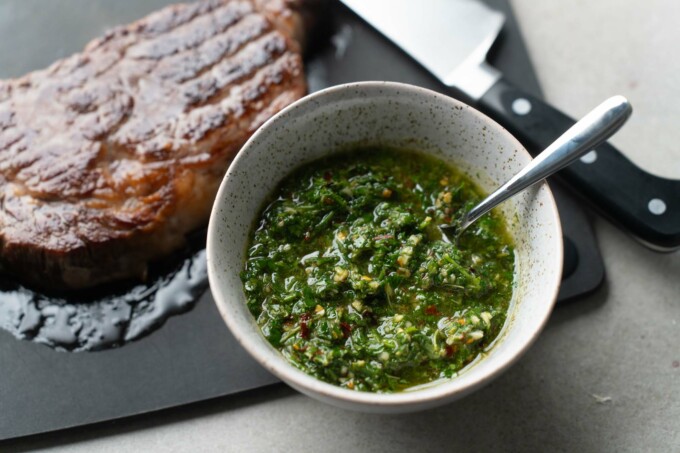
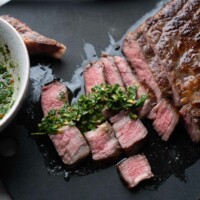
Steak With Chimichurri Sauce
Ingredients
Chimichurri
- 1 c fresh flat-leaf parsley packed
- ½ c fresh oregano packed
- ½ c extra virgin olive oil
- 6 cloves garlic
- 1 ½ tbsp red wine vinegar
- 2 tsp red pepper flakes
- ½ tsp kosher salt Diamond Kosher salt
- ¼ tsp black pepper
Steak
- 16 oz steak ribeye or any cut of your choice
- kosher salt
- black pepper
- neutral oil
Equipment Used
- food processor (or blender)
- measuring cups and spoons
- spatula
- cast iron
- sheet pan and cooling rack
- tongs
- paper towel
Instructions
Chimichurri
- Combine all the ingredients in a food processor.
- Blend until the herbs are chopped, but not too fine. Don’t overprocess this, or it will be mushy. See photo for target consistency.
- Taste the chimichurri and adjust seasoning based on your preference.
- Set aside until steak is ready to eat.
Reverse-Seared Ribeye Steak
- You can use any cut of steak with chimichurri, but we're going to use ribeye in this recipe. Remove ribeye from the fridge and generously sprinkle kosher salt all over. Let sit on a cooling rack over a sheet pan for 1-2 hours for a 1-1.5” thick cut for it to come to room temperature.
- Preheat an oven or convection oven to 175 °F, and when it hits temp, add the steak (on the rack and sheet pan) into the oven.
- Cook the steak until it hits your exact desired doneness temperature. Due to the low baking temperature, do not expect carryover heat, but do plan for about ~5 degrees of extra doneness from searing. Probe the very center of the steak with a thermometer or check with an instant-read thermometer to gauge doneness. It may take around 10-45 minutes, depending on steak temperature, steak thickness, and if you have the convection setting on.
- Remove the steaks and pat dry with a paper towel. There’s no need to rest the steaks. Pre-heat a cast iron skillet on high, then add a generous amount of oil and sear the steaks on high heat to get a nice browning on both sides. Be careful not to sear too long as you don’t want to really continue cooking the steak beyond ~5 degrees more internally.
- Remove the steaks from the pan and serve immediately with chimichurri.

